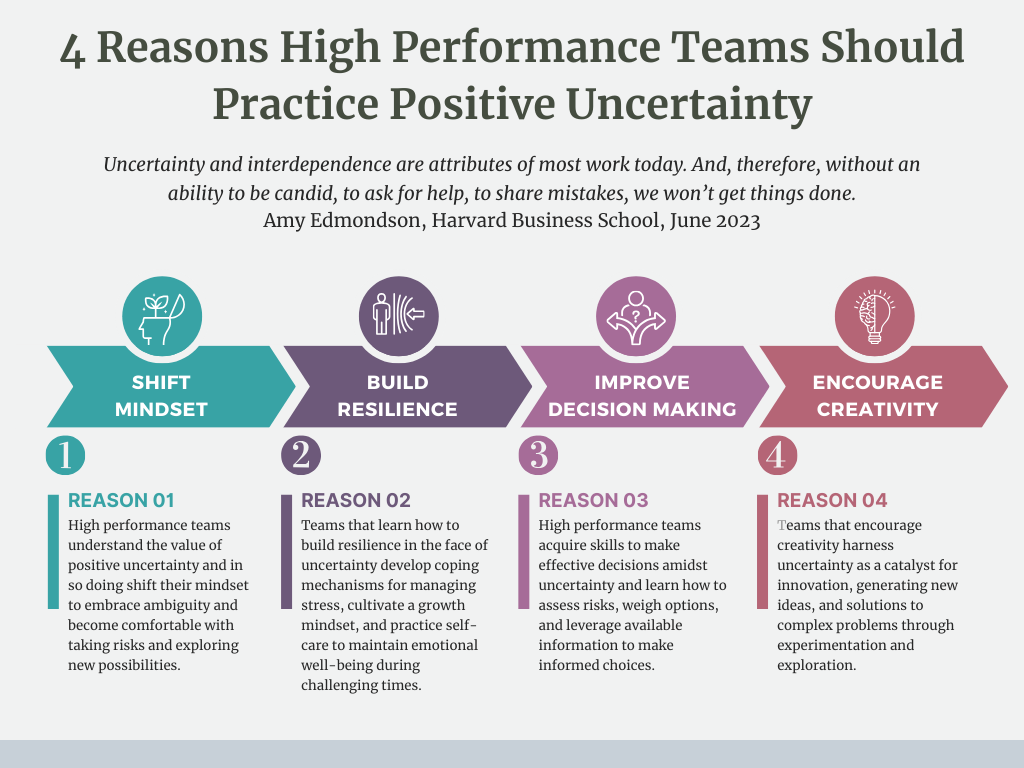
Embracing Positive Uncertainty: The Essential Traits for High-Performance Teams
Embracing Positive Uncertainty: The Essential Traits for High-Performance Teams
In today's fast-paced and ever-evolving world, high-performance teams face a myriad of challenges that demand adaptability, resilience, agility, and creativity. Uncertainty has become a constant companion in the landscape of business, technology, and society. In such an environment, the ability to embrace uncertainty and harness its potential becomes crucial for success.
As Rebecca Zucker and Darin Rowell noted in "6 Strategies for Leading Through Uncertainty," their 2021 Harvard Business Review article “we must learn to acknowledge and embrace the discomfort of uncertainty as an expected and normal part of the learning process. As described by Satya Nadella, CEO of Microsoft, leaders must shift from a ‘know it all’ to ‘learn it all’ mindset. This shift in mindset can, itself, help ease the discomfort by taking the pressure off of leaders to have all the answers.”
Here are four reasons high-performance teams should practice positive uncertainty.
- First and foremost, a shift in mindset is essential for high-performance teams navigating uncertainty. The traditional approach of adhering rigidly to predefined plans and strategies often falls short in dynamic environments. Instead, teams must cultivate a mindset that embraces change, welcomes ambiguity, and sees challenges as opportunities for growth. By adopting a flexible and adaptive mindset, teams can quickly pivot strategies, seize emerging opportunities, and stay ahead of the curve. Moreover, a shift in mindset fosters a culture of continuous learning and innovation, enabling teams to thrive in the face of uncertainty.
- Building resilience is another critical trait for high-performance teams in uncertain times. Resilience equips teams with the ability to bounce back from setbacks, adapt to unforeseen circumstances, and persevere in the pursuit of their goals. In a volatile and unpredictable world, resilience acts as a shield against adversity, enabling teams to weather storms and emerge stronger than before. By cultivating resilience, teams develop the capacity to withstand challenges, maintain morale, and sustain high levels of performance even in the face of uncertainty.
- Improving decision-making is paramount for high-performance teams operating in uncertain environments. Uncertainty often complicates the decision-making process, as teams must navigate ambiguity, assess risks, and make choices amid incomplete information. Therefore, honing decision-making skills becomes essential for making informed and effective choices in uncertain circumstances. By adopting strategies such as scenario planning, data-driven analysis, and collaborative decision-making, teams can mitigate risks, capitalize on opportunities, and steer their course with confidence amidst uncertainty.
- Furthermore, enhancing creativity is indispensable for high-performance teams to thrive in uncertain environments. Uncertainty stimulates creativity by challenging conventional thinking, encouraging experimentation, and fostering innovation. In an environment where the only constant is change, creativity becomes a potent tool for problem-solving, differentiation, and competitive advantage. By nurturing a culture of creativity, teams can generate novel ideas, explore unconventional solutions, and adapt to evolving market dynamics with agility and ingenuity.
In conclusion, high-performance teams must practice the positive uncertainty traits of shifting mindset, building resilience, improving decision-making, and enhancing creativity to excel in today's uncertain world. Embracing uncertainty as a catalyst for growth and innovation empowers teams to navigate complexity, seize opportunities, and thrive amidst change. By cultivating these essential traits, high-performance teams can adapt, evolve, and outperform in the face of uncertainty, ensuring sustained success in an ever-changing landscape.

